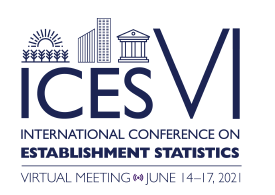All Times ET
Program is Subject to Change
TBD
Risk-Efficient Bayesian Data Synthesis for Privacy Protection (307935)
*Jingchen (Monika) Hu, Vassar CollegeTerrance D Savitsky, Bureau of Labor Statistics
Matthew Williams, National Center for Science and Engineering Statistics
Keywords: Bayesian hierarchical models, data privacy protection, identification risks, pairwise, pseudo posterior, synthetic data
Statistical agencies utilize models to synthesize respondent-level data for release to the public for privacy protection. In this work, we efficiently induce privacy protection into any Bayesian synthesis model by employing a pseudo likelihood that exponentiates each likelihood contribution by an observation record-indexed weight in [0, 1], defined to be inversely proportional to the identification risk for that record. We start with the marginal probability of identification risk for a record, which is composed as the probability that the identity of the record may be disclosed. Our application to the Consumer Expenditure Surveys (CE) of the U.S. Bureau of Labor Statistics demonstrates that the marginally risk-adjusted synthesizer provides an overall improved privacy protection; however, the identification risks actually increase for some moderate-risk records after risk-adjusted pseudo posterior estimation synthesis due to increased isolation after weighting; a phenomenon we label "whack-a-mole". We proceed to construct a weight for each record from a collection of pairwise identification risk probabilities with other records, where each pairwise probability measures the joint probability of re-identification of the pair of records, which mitigates the whack-a-mole issue and produces a more efficient set of synthetic data with lower risk and higher utility for the CE data.
